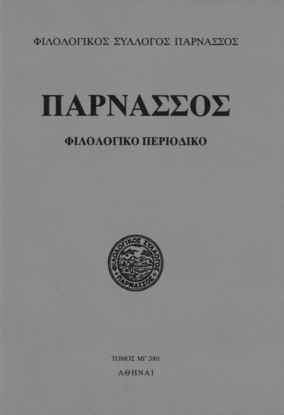Η φωνή του ποιητή στην μεταγενέστερη επική ποίηση (Κόιντος-Νόννος)
Part of : Παρνασσός ; Vol.ΜΓ, No.1, 2001, pages 13-44
Issue:
Pages:
13-44
Parallel Title:
The poet’s voice in late epic poetry (Quintus-Nonnos)
Abstract:
Among the various narrative modes and inventions that late epic poets inherited from Homer, one can distinguish a series of expressions underlining the selfawareness of the poet and reminding his presence to his public. These expressions include the apostrophe (address) to the reader/auditor, the apostrophe to the heroes of the epos and the invocation to the Muses. The contribution of the paper to the study of the narratological techniques of late epos consists in a thorough analysis of the apostrophe to the reader/auditor in the poetry of Quintus and Nonnos. After examining several passages of the aforementioned epic poets, the author is led to the following conclusions: 1) The typical apostrophe in the second person singular, inherited from homeric poetry, is also present in the works of later poets, who extend its use to a form of comparison. This tendency is rather limited in Apollonius of Rhodes, but fully developed in both Quintus and Nonnos. 2) The use of the apostrophe in descriptions of objects and works of art (ekphrasis) constitutes an innovation of later poets, especially Apollonios and Nonnos, since it is not encountered in Homer. 3) Moreover, Quintus uses the apostrophe in the frame of the presentation of various aitia; here the apostrophe is the link between the real event which the aition originated from and the false impression generated by the misinterpretation of that event. In addition to these uses, we encounter in Nonnos a series of apostrophes inspired not from epic poetry, but from rhetoric, and constituting a kind of refutation of the possible objections that might be formulated by the reader/auditor.
Subject:
Subject (LC):




